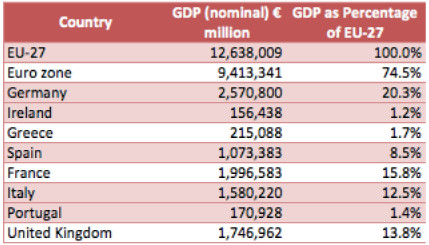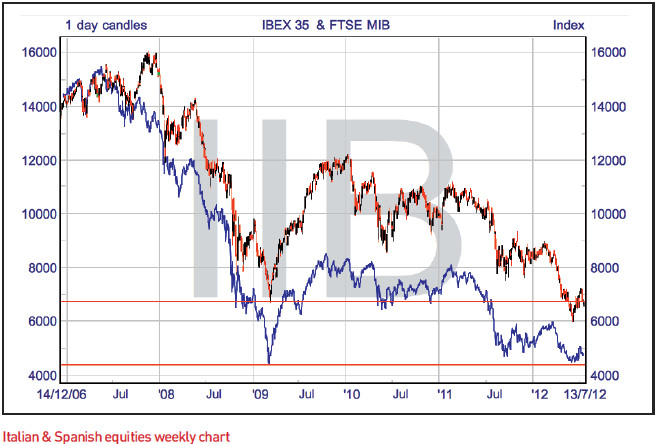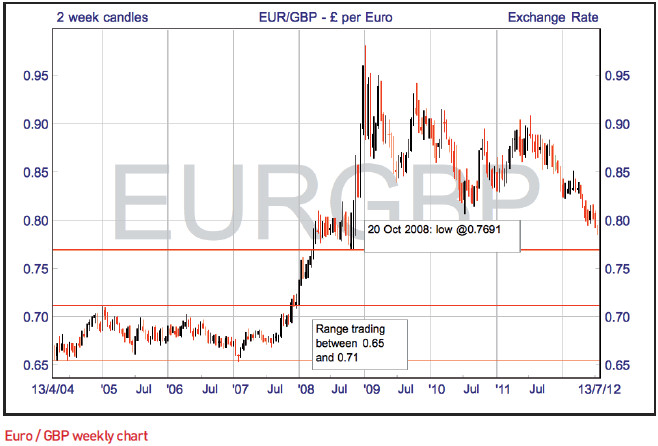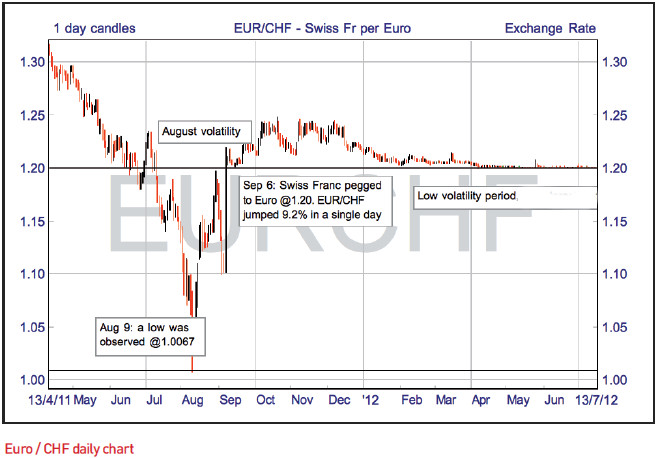Spreadbetting on a Eurozone Breakup
Aug 9, 2012 at 3:20 pm in Fundamental Analysis by Dave
Over the last few years, especially following Ireland’s bailout, many voices have been heard, many debates have been made and many newspapers have been sold; all centred on the Eurozone’s problems and trying to explore the potential consequences of a possible breakup.
The Eurozone, as a group of seventeen, is in serious danger as many see it shrinking. If everything occurs in an orderly manner, the Eurozone may lose one member or maybe two or three in one year’s time, but still keep going. If things go terribly wrong, the Eurozone may consolidate into a core of strong Northern nations anchored by France, Germany and the Benelux and a 2-tier continent similar to the old days before the ERM will likely emerge. The austerity measures imposed on Portugal, Ireland, Italy, Greece and Spain (the so called PIIGS) have been so rigid that these governments are now facing huge costs as a consequence of the implementation of these measures, and that are translating into galloping unemployment rates and abrupt contractions in the respective countries economic output.
Living conditions are deteriorating quickly and social upheaval is arising.
The Greeks had to renegotiate debt terms last year to avoid a default and a number of Spanish banks also had to receive a bailout a few days ago to avoid bankruptcy. Similarly, Cyprus is now part of the ignominious club of bailed out countries, and uncertainty about the future for these nations continues to rise.
In order to avoid being caught off-guard in the middle of a political and economic chaos, spread bettors need to understand all the options and possibilities they face.
The effects that would reverberate from a partial or total breakup extend to all markets and asset classes, and the potential gains or losses may be gigantic – get these right and your year is made; get them wrong and you’ll be crying into your cornflakes!
Let’s take a look into the most likely scenarios.
Three Scenarios We Must Consider
Between a partial and a full breakup there are so many variations that it would be impossible to consider them all, but there are at least three scenarios that are worth being highlighted: a total breakup, a split into two euro areas, and a shrunken euro area. The last scenario is, in our opinion, the most likely to happen at this point, but we will briefl y look at all options.
Total Breakup
A total breakup is something that is very unlikely to suddenly occur quite simply because of the vested political capital and interest of the major European leaders who will try everything they possibly can to keep the Euro alive. Only after failing completely they will put such an option on the table. A total breakup is more likely to occur as a consequence of a partial breakup that went really wrong. At that point, the worst would have likely come to pass and a total breakup would be a mere formality.


Split Into Two Euro Areas
This is another option with, in our opinion, a low probability of occurring, but has been put on the table several times not only now but also before the creation of the Eurozone. Since there is a distinction between the PIIGS and the rest of the Eurozone or, more simply, between the northern and southern countries, some economists think Germany could try to create a restricted euro area with countries like Austria and the Netherlands that have more of a tradition of imposing tight controls on budget defi cits and let the other countries form a second Eurozone.
Since France would hardly accept German leadership, it would probably prefer to join this second Eurozone as the leading country. But one of the reasons that led to the creation of the EU in 1957 was to join Germany and France in the same area. A split into two euro areas would undermine the original objectives of the EU creation. If France were to opt out of such a ‘fi rst’ Eurozone group, then every other country would see the second group as a sort of championship league for the relegated teams. The idea of Europe running at two speeds has previously been abandoned and we doubt it can be adopted now.
Partial Breakup
This is the most likely scenario, and the one spread bettors should be prepared for. At some point in time, one or more Eurozone countries can decide to exit (or maybe not actually being left with any other option).
The effects deriving from such a decision would vary widely from country to country and depending on how suddenly it occurs and also how mutually agreed-upon the exit is. The bigger the surprise; the uglier the financial consequences.
The most discussed possibility has been that of a Greek exit. Germany, and especially Finland, are giving out increasingly more apparent signs of an
unwillingness to supply much more in the way of funds or, indeed, to give any extension on adopted measures for the bailed out countries. With Greece’s GDP representing just 1.7% of the EU total output as the chart above illustrates, they may be tempted to cut the oxygen.
No doubt preparations for such an outcome have been scenario tested and the major banks would survive it.
The exit would occur in an orderly manner and, aside from an initial knee-jerk reaction, equities around the world wouldn’t suffer much from it. The Greek’s
would, of course, suffer the most with unemployment rising, output being slashed and their international trade initially falling. The Drachma would be re-introduced – with a probable immediate halving of its value relative to its Euro entry level.
The gains in competitiveness would be outpaced by inflation in the short term and the economy further throttled by rises in interest rates. It seems that either route, inside or outside the euro, the Greeks will continue to see their economy shrink. Should Greece be ejected from the Eurozone, a trade to consider would be to buy the exporters and those tourism exposed plays on a sharp sell off.
Unfortunately, financial and economic linkages are strong in this era of Globalisation and, if Greece is pushed out, investors would start to fear the same fate for the other PIIGS, and will require higher yields to buy Sovereign debt from these troubled countries. No matter the efforts to accomplish all troika goals,
Portugal, Italy, Ireland, and Spain would face prohibitive borrowing costs in public debt markets. That may trigger the need for a bailout in the giant of the pack – Italy or the need for further austerity in others. Downgrades from ratings agencies would follow, share values would suffer in those countries and the Euro will become more volatile. The problem of a simple, orderly exit by only Greece would likely turn into the problem of an exit question hanging over several other countries.
If more than one country exits, or if one of the exiting countries is Italy or Spain, things would be uglier, much uglier… Italy and Spain are the fourth and fifth largest EU economies representing 12.5% and 8.5% respectively of the Union’s GDP.
If one of those is pushed out of the Eurozone, the negative effects would spread very quickly. First of the exit of one of those countries would almost certainly lead to the inevitable exit of all the other PIIGS. As a whole, they represent one quarter of EU GDP, a negligible portion like Greece. The Euro would most likely suffer huge losses against the US Dollar, the and the Pound as investors run for the exit from Sovereign bonds. Banks all over Europe own too many assets from these countries and their balance sheets simply wouldn’t be able to absorb the losses and many would fail. Credit conditions would tighten all over Europe and recession couldn’t be avoided.
Italy and Spain are key to this problem and spread bettors should concentrate on how their specific situations develop. The Ibex 35 and the FTSE MIB have plunged more than 30% since 2011 and short positions continue to be favoured. Short positions on the large German and UK banks would be fertile profit hunting ground too.

What May Happen In The UK?
The disruption of the Eurozone, or at least of part of it, has important potential effects on the British economy. The pound has been acting as a safe heaven in recent months, in stark contrast to the severe depreciation of recent years. Investors and citizens of troubled countries are looking for places to put their money and the pound is presently near the top of their list of choices.
The coalition government welcomes this influx of capital (if not the BoE) as it provides them the ability to raise debt at a very low cost. A 10-year Gilt is currently yielding just 1.55%, near generational record-lows and, if trouble continues to mount in the Eurozone, this yield is expected to decrease potentially even more.
Spread bettors may defensively add some Gilts to their portfolios and benefit from such a situation. Shorting the EUR/GBP cross is also a valid option as the extra demand for pounds may continue to push up the price of the Pound relative to Europe.
The pair is quickly approaching the low observed on October 2008 at 0.7691 and if a breakup of the Eurozone does materialise the range trading observed during 2005 and 2007 between 0.65 and 0.71 could very easily be reached again.

The Swiss Franc Peg Won’t Hold
The Eurozone problems have resulted in such an increased demand for the Swiss Franc that the Swiss National Bank (SNB) were forced to implement a ‘peg’ to the Euro at a rate of 1.20, after exhausting all other traditional measures to curb its strength. The SNB cut its key interest rate to zero but that didn’t prevent money from entering the country and denting economic growth.
And so, in a desperate move, the SNB pegged the currency to the Euro. Can this peg hold in the event that there is a significant euro area exit? It’s hard to believe. People looking for safe places to put money will target the Swiss Franc and will frustrate the SNB efforts. Being short on EUR/CHF is a potential low risk bet with significant profit potential – what is called a positive risk: reward skew.

Germany Will Be In Trouble
The German economy is an export driven one. Half the €2.57 trillion the country registered as output last year came from exports and the EU is the main destination representing 59% of the country’s total market.
In the event of a major disruption in the Euro, a new Deutsche Mark would likely appreciate so dramatically, and the contraction amongst European countries would be so acute that Germany would inevitably suffer a deep recession.
China, US And The Rest Of The World
The US and Japan may be countries that have some degree of firewall protection, but they won’t be in a safe position in the medium term. China is a major concern. The country has already been cooling as detailed in the latest GDP data, and its main import and export partner is of course the EU. Should the Eurozone end or shrink, or even if the EU economies simply continue retreating, international trade will be affected and Chinese policy makers will not be able to avoid a hard landing for the economy.
Conclusion: Any break away by a member country of the Euro, even if only a partial break up, would result in a severe drag on most global economies, and would be a serious drawback for the European project; representing a retreat of decades of vested political interest – this will not be given up easily. Any recession would be deep and long lasting.
As a spreadbettor, if you are in the camp that we will muddle through, then a risk long position in Italian and Spanish equities could pay handsome dividends, as
with a short Gold and long Euro position. If you want to position yourself for a break up, then a look at Eurusd Put options, Treasury bond Call options and FTSE Put options will likely provide materially profitable pay offs should the worst come to pass.
Will a breakup really happen? No one knows for sure, but I don’t doubt that Angela Merkel, against what many think, will try to avoid it at all costs. An export-driven economy, with 60% of its exports being absorbed by the EU, would only be a big loser with the end of the single currency. Place your bets!
Article reproduced from the August edition of Spreadbet eMagazine

